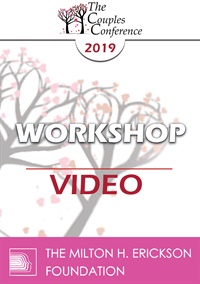CC19 Workshop 01 - Introduction to the Developmental Model of Couples Therapy - Ellyn Bader, PhD
Credit Available - See Credits tab below.
Total Credits: 1.5 including 1.5 A.P.A.
- Average Rating:
- Not yet rated
- Topic Areas:
- Workshops | Couples Therapy | Developmental Therapy Model
- Bundle(s):
- CC19 Main Conference Video Bundle | CC19 Individual Selections
- Categories:
- Couples Conference | Couples Conference 2019 | Online Continuing Education | Pioneers in Couples and Family Therapy
- Faculty:
- Ellyn Bader, PhD
- Course Levels:
- Master Degree or Higher in Health-Related Field
- Duration:
- 1:20:29
- Format:
- Audio and Video
- Original Program Date:
- Apr 12, 2019
- License:
- Never Expires.
Description
Description: Join Ellyn Bader as she provides a solid introduction to The Developmental Model of Couples Therapy. This model enables you to make a targeted assessment of what’s wrong and then select stage-specific interventions based on the developmental capacities your clients are lacking. Learn to move your clients from hurt, bitterness and outrage to collaboration, openness and increased accountability. Ellyn will use video demos and transcripts to reveal the power of this model.
Syllabus Description: Join Ellyn Bader as she provides a solid introduction to The Developmental Model of Couples Therapy. This model enables you to make a targeted assessment of what’s wrong and then select stage-specific interventions based on the developmental capacities your clients are lacking. Learn to move your clients from hurt, bitterness and outrage to collaboration, openness and increased accountability. Ellyn will use video demos and transcripts to reveal the power of this model.
Educational Objectives:
- Integrate Attachment and Differentiation Theory and Apply these to Couples Development.
- Demonstrate an understanding of basic neuroscience to explain couples fight patterns.
*Sessions may be edited for content and to preserve confidentiality*
Credits
1.5 credits available.
The Milton H. Erickson Foundation, Inc. is approved by the American Psychological Association to sponsor continuing education for psychologists. The Milton H. Erickson Foundation, Inc. maintains responsibility for this program and its content.
THE MILTON H. ERICKSON FOUNDATION Policy on Disclosure
The Milton H. Erickson Foundation is proud of the conferences and other
educational opportunities it sponsors, taking care that the conduct of
these activities conforms to the standards and principles of behavioral
and medical sciences, thus ensuring balance, independence, objectivity
and scientific rigor in all individually sponsored or jointly sponsored educational
activities.
All faculty members participating in a sponsored activity, and those who
review and therefore are in control of content, are requested to disclose
any relevant financial relationship prior to the CME activity, including but
not limited to specific commercial interests, financial remuneration received
by faculty member or spouse, and what role or activity was performed
for this remuneration. If a conflict of interest exists as a result of
a financial relationship it will be resolved prior to the activity. A faculty
member will not be allowed to present if the conflict is not or cannot be
resolved.
Handouts
| Ellyn Bader - Intro to the Developmental Model (2.7 MB) | Available after Purchase | ||
| Ericksonian Learning Snapshot (244.4 KB) | 2 Pages | Available after Purchase |
Faculty

Ellyn Bader, PhD Related Seminars and Products
Ellyn Bader, PhD, is a founder and director of The Couples Institute in Menlo Park, California. As a clinical psychologist, workshop leader, author, and speaker, she is dedicated to helping couples create extraordinary relationships. Over the past 30 years she has trained therapists in couples therapy throughout the United States as well as Europe, Asia, South America, and Australia. She served as a Clinical Faculty in Stanford University School of Medicine for 8 years.
Reviews
Rating: Not yet rated


